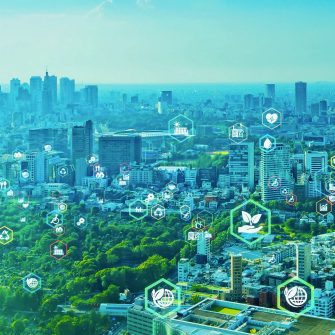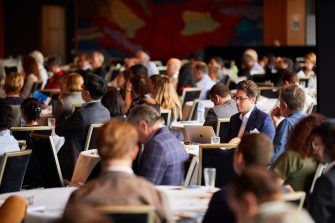Research & impact


Sustainable Industries
Sustainable Industries
The pace of digital technology’s evolution is disrupting the foundations of businesses and entire industries with a dramatic impact on economic, social, and environmental sustainability (George, Merrill, & Schillebeeckx, 2020). In theme three, we explore and analyse digital enablement and sustainability on three analytical levels: industry, business organizations, and employees. Specifically, we are interested in contributing to the sustainability of the AEC industry by consequently developing a model that is applicable more broadly. The AEC industry is the focal point because it impacts the sustainability of where and how work is conducted across many industries and is particularly pertinent to COVID-19-related pandemic changes (Parker, 2020). We aim to create a ‘roadmap’ to navigate business leaders, educators, and researchers through the multiple strategic tensions in the journey towards ‘digital sustainability’. Our programme directly tackles SDG 9 and 11.
The combination of digital enablement and sustainability is a global and complex grand challenge. Advice for this approach has been to assemble diverse communities of experts – academics and practitioners – at a local level so that investigators can remain close to the challenges (Brammer, Branicki, Linnenluecke, & Smith, 2019). For this reason, our focus is initially on the AEC industry. We aim to translate the research insights to academic programmes and will help turn potential additional partners into collaborators.
Ongoing project (s):
Industry transformation to promote a digitally enabled, sustainable AEC industry
We address the issues of bringing industry leaders and businesses on board to fully capitalize on the opportunities of digital transformation in order to maximize the impact of sustainability both in terms of economic growth and employee well-being. This includes exploring the impact of smart city strategies on business activity and re-envisaging the architecture of industry ecosystems more broadly. We build on ongoing interdisciplinary work with faculty members from business (MNGT, ISTM, and AGSM) and the Built Environment to examine and design solutions for identified challenges, cooperate with a set of established AEC business partners (Architectus, Cox, and MottMacDonald), and continuously expand this partner-set by working with Built Environment and AGSM faculty members. We seek to develop frameworks and process models that will guide industrial transformation, starting with an online infographic tool (to engage potential collaborators) and practitioner-oriented outlets to share high-level insights.

Sustainable Urban Environments
Sustainable Urban Environments
To help make urban environments sustainable, one challenge is to reduce the waste produced from construction activities. Previous studies have identified that the global construction industry is responsible for approximately 40% of all carbon emissions and is the single largest consumer of materials on the planet. Of that material consumption, 10-20% will end up in landfills. Much of this waste, such as steel or concrete, is carbon intensive.
We aim to address the problem of waste in the construction industry – not in the sense that we use recycled materials to build buildings, but by investigating the following logic towards lean construction to achieve zero waste. However, there is one key question – who is responsible for the materials used and waste produced and where does the waste get produced? Is it the architect that produces it (after all they design the building), or is it the builder (after all they build the building)? In digital sustainability, we can take a step back and think about buildings, their designs and their materials as data we can use to investigate and assess what we can do with the data and if we can transform them into knowledge and tools that enable the construction sector to reduce its carbon emissions, material consumption and waste production.
We aim to apply a postdisciplinary, pragmatic approach working together with academics from business, the built environment, engineering (civil and manufacturing), computer science and data analytics. The overall agenda is to provide the foundation for a synthetic design method that combines machine learning and computational design to design sustainable and liveable cities. Below, we provide our proposed project list and key research areas.
Ongoing project (s):
- Experiments in ML for Architecture and Design: This project aims to develop machine learning tools tested for urban design in Western Sydney and architecture in designing a future entry to the Solar Decathlon sustainable housing competition.
- Task Planning for Computational Design Tools: This project uses task planning to establish a sequential order to tasks using ML. Tasks are computationally designed scripts in either Grasshopper or Python with inputs and/or outputs that need to be ordered by ML.
- CSS for 3D Design: This project aims to build a 3D design framework as a ‘spine’ or ‘conveyor belt’ that allows a) data sourced in Project 1 to be fed in, b) data gained through machine learning in Project 4 to be fed in, and c) sequentially organised computational tasks in Project 3 to be fed in.
- Data mining and cleaning: This project aims to collect as much data suitable for the built environment as possible using web and HTML scraping, storing data in the REST framework, and cleaning and preparing the sourced data sets for later machine learning.

Sustainability and Resilience
Sustainability and Resilience
Digitally enabled solutions are moving cities towards smart solutions that position businesses and communities at the centre of sustainable solutions to the challenges of growing cities worldwide. Against the backdrop, in this theme, we seek to explore and contribute to the multifaceted aspects of sustainable city development.
Ongoing project(s):
- Developing frameworks for Smart City Solutions that prioritise safety and privacy: Current smart-city initiatives are heavily reliant on market-led solutions. Frequently, these siloed initiatives do not achieve the desired outcome for governmental and non-governmental stakeholders. The silo approach to smart city initiatives has “failed to scale or demonstrate real benefits” (Barns et al. 2017) and does not pay sufficient attention to issues of flexibility and interoperability that are critical to delivering tangible benefits to residents, visitors and businesses (Johnston 2020). Therefore, in this project, we seek to develop frameworks and process models that can potentially guide the co-creation of smart city initiatives.
- Enhancing the capacity for participatory human settlement planning and management concerning the integration of refugees and migrants: On arrival, refugees and migrants depend on timely information about the essential aspects of daily life in Australia. Unfortunately, the much-needed information is scattered across many stakeholders, so it is often inaccessible, confusing, or inaccurate. To address this issue, we aim to create a digital platform to enable organisations to deliver accurate, timely, and relevant information to refugees and migrants. Our current partners on this project include the not-for-profit organisations Tür and Tür Digital Factory (Augsburg, Germany), CORE Community Services (Fairfield, NSW) and NSW state government departments (TAFE NSW and Department of Health).
- Supporting city actions for a safe, secure and resilient digital future: Maintaining the safety, security and resilience of the digital infrastructure and ecosystem is becoming increasingly crucial, yet challenging, as more innovative digital solutions and models are being implemented to support the various building blocks of sustainable cities. This project seeks to develop a new framework that integrates three distinct but interrelated components that are strongly interwoven into the fabric of digitally sustainable cities – digital trust, cyber security and digital resilience – to identify the opportunities, challenges and trade-offs that are important for informing the strategic and collective governance of a sustainable future.

Sustainability Intelligence
Sustainability Intelligence
This project involves the development of a sustainability intelligence system aimed at tracking and analysing Environmental, Social and Governance (ESG) efforts as organizations move toward achieving UN’s Sustainable Development Goals (SDGs).
How companies deal with sustainability issues will affect how they address business opportunities and achieve overall sustainability success. One key element to the overall sustainability performance is the design and implementation of ESG initiatives.
S2, a data-driven system anchored on analysing multi-framework ESG disclosures, was developed by the Director of UNSW Digital Sustainability Knowledge Hub, Professor Shan Pan and his team. Powered by AI-based algorithms, the system equips organizations with strategy visualization capabilities to track sustainability efforts, design sustainability initiatives and optimize investments. The system was also designed to be integrated into the existing digital ecosystem, which would bring sustainability initiatives to the forefront of digital innovation and organizational transformation.
The system was developed in response to the significant growth in organizations’ ESG commitments in recent years. To contribute to achieving SDGs, organizations will need access to advanced data analytics to manage the vast amounts of sustainability initiative-related data, utilize strategy visualization techniques and develop easy-to-access dashboards for strategy making and benchmarking purposes.
The new solution aims to make sustainable-focused innovation identifiable, searchable, and trackable by connecting community initiatives to the SDGs, providing insight into sustainable innovation on a global basis, and allowing users to analyze innovation strength across distinct fields of sustainability.




